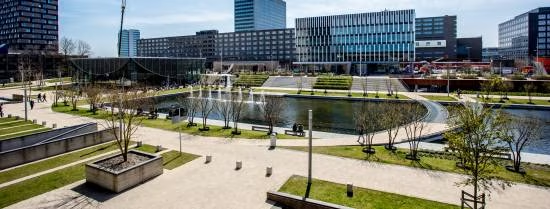More greenery, especially in the city, and better care for the environment. According to biology professor Kees Vink, this is of vital importance. "As scientists, we must ensure that the public takes the message seriously. Not as a voice in the wilderness, but as a partner."
Why a biology professor at Erasmus University Rotterdam?
"The western world is urbanising more and more. As a result, we are displacing nature. I am committed to bringing nature back to the city. As a university, we must also raise awareness; that is a university's task. To feed policy makers, inform the public and educate students. And dispel misconceptions. For example, that electricity is a clean form of energy. But seventy per cent of electricity is generated using fossil fuels. But also: why do we want a better operating system for our computer or a new iPhone every year? That contributes enormously to the consumer society that we have to get rid of."
You are strongly connected with the Rotterdam Natural History Museum.
"The museum is scientifically close to us. My teaching assignment From Big Natural History to Urban Ecology has grown out of collaboration in all sorts of areas, from evolutionary biology to ecology. The network professorship is really about making connections. The enormous collection of the museum is very interesting and the Museum has the Bureau of Urban Nature, Urban Ecology. We monitor nature in the city. How is it doing? What kinds of flora and fauna do we have? What are the developments? How can we improve? These kinds of questions - which are very useful for society - we will investigate together with students."
Kees Vink's message to the EUR community:
Throw the tiles out of your garden and let nature take its course! A street plant is also nature: enjoy it! Consume less and plant more greenery!

You set up a unique bachelor at Erasmus University College.
"Rotterdam has no physics or biology faculty. Only some subjects and masters within Medicine. I was given the opportunity to design a broad bachelor's programme with the Rotterdam Natural History Museum and Erasmus MC, with a place for biology. Students are given subjects from various disciplines, learn academic skills and are encouraged to be critical, proactive. At University College, academic education is substantive and personal. Students come from all over and are really engaged, very dedicated."
Which social partners do you work with?
"With several. The lack of a biology study programme in Rotterdam made it possible to broaden the scope and to look for contacts outside the university. For example, students do internships and practicals at the Natural History Museum, but also at Arboretum Trompenburg and Rotterdam Zoo. Some students do voluntary work at the zoo. In this way we also contribute to society in a direct way. Erasmus University Rotterdam has an outreach programme, with which we want to generate impact. This is actually part of it: show as a university and as a student what you can do, and get involved!"
'Biodiversity is a prerequisite for life on earth to continue'.

What do you want to achieve during your professorship?
"More green and better nature in the city. The appointment as endowed professor has given a boost. I am asked for lectures, for advice, so all in all urban ecology is getting more attention now. My greater mission is to realise more impact. As scientists, we must ensure that the public takes the message seriously: biodiversity is declining and that is really due to our actions. The task of the university is also to point out the role of diversity of life in all its facets. And that this diversity - plants, animals, fungi and bacteria - is essential for ecosystems on which we depend for clean water, food and air. Biodiversity is a prerequisite for life on earth to continue. Its loss is at least as great a threat as climate change."
How do scientists stay in the lead?
"By gathering information, working in a data-driven way, networking and giving advice. And also: sketching scenarios, removing false assumptions, stereotyping and giving a critical voice to plans that are not good. As scientists, we must no longer be the voice in the wilderness, but partners. Also towards politicians. Not just saying the right things, but trying to give the message real substance. The public's mentality is also important; don't see nature as a nuisance. We have to get rid of stereotypes: oops, a rat. Shoot it! No, it is part of nature. A rat is a beautiful animal, intelligent and very social. Enclose nature, not exclude it. That message is also my mission."
Kees Vink received his biology degree at Leiden University and obtained his doctorate in 1993 at the Netherlands Cancer Institute with a study on the AIDS virus. After Amsterdam and Maastricht, Erasmus MC became his home base in 2006. Vink is head of the Life Sciences department at Erasmus University College. In November 2020, he was appointed endowed professor From Big Natural History to Urban Ecology. His position is sometimes referred to as biology professor and urban ecologist. Vink is the first professor in this chair.
- More information
Kees Vink appointed to endowed chair ‘From Big Natural History to Urban Ecology’. Read the article at The Natural History Museum Rotterdam website.
Curious about our university's strategy on sustainability?
- Related content

